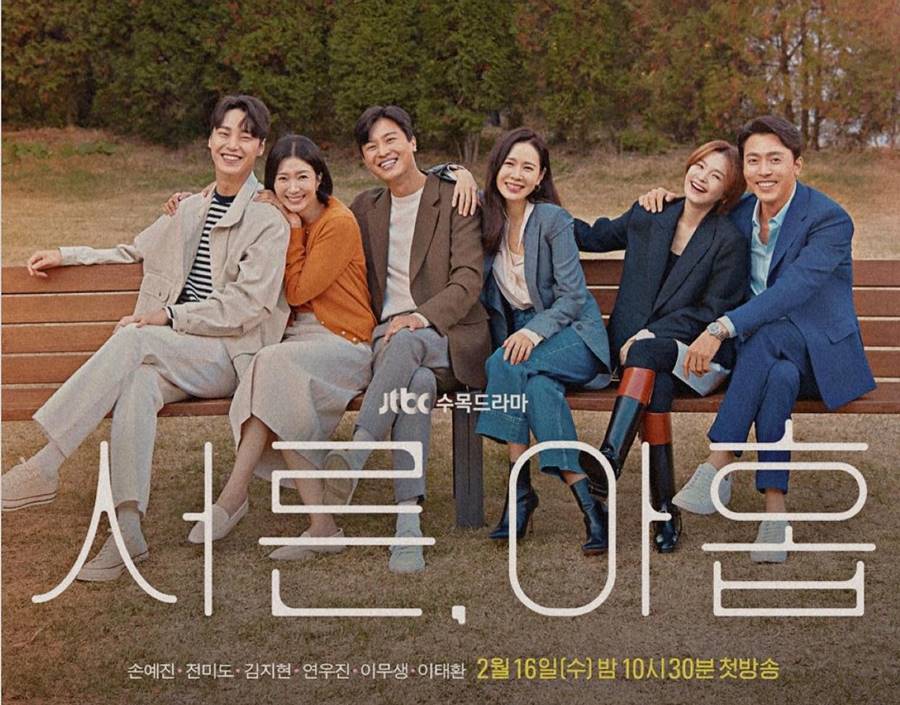
By Jae-Ha Kim
Substack
May 2, 2022
![]()
Cha Mi-jo (played by Son Ye-jin)
Jeong Chan-young (played by Jeon Mi-do)
Jang Joo-hee (played by Kim Jin-hyun)
↑Note: Korean names denote the surname followed by the given name.
Television (and films) have never been kind to older actresses. And by older, I mean as young as late 30s. To put things into perspective, Sally Field was 48 years old when she played Tom Hanks’ mother in “Forrest Gump.” Hanks was only 10 years younger than her. Chris Isaak said producers were reticent about casting him in “Little Buddha” because they said he looked too young to be the father of a tween. He was 37 at the time. Meanwhile, they selected Bridget Fonda — then 29 — to portray the boy’s mother.
I’m not sure why there are so few women-centric K-dramas, since there’s a proven track record that people will watch (if they’re good). Case in point: “Mine” and “Search: WWW.”
“Thirty-Nine” centers on a trio of female best friends played by actresses who range in age from 39 to 40. None of them are married. Their lives are messy. And unlike many K-dramas where the characters don’t engage in any kind of physical relationship, one of the characters actually has a one-night stand that leads to more. Another is in an emotional relationship with a married man. And the third has a crush on a younger guy.
We know from the first episode that one of them will die. And even though we can guess who it will be, it doesn’t take any of the pain away when it happens.
While men certainly play a role in this series, the biggest loves of their lives are each other. They met when they were high school students (at different schools). Mi-jo was trying to find her birth mother, which led her to borrow money from Chan-young at a subway station, and to the tteokboki restaurant run by Joo-hee’s mom.
The adoption element presents a different side to the birth mother trope. And the script includes thoughtful vignettes of Mi-jo discussing her complex emotions with a therapist. You can have a loving relationship with your adopted parents, but that doesn’t lessen the pain of having been relinquished by your biological family for whatever reason. And Mi-jo seeking help from an expert is presented as completely normal, rather than a flaw.
I do wish that the series had presented a more realistic view of the adoption process. In the two examples in this series, it appears that families simply pick out the youngster they want at a child welfare facility. This isn’t true at all. The vetting process to adopt a child is much much more stringent. And it should be.
Airdates: Twelve 70- to 80-minute episodes aired on JTBC from February 16 to March 31, 2022.
Spoiler Alert: One of the moments that was meant to be a sign of solidarity was frustrating for me to watch. Joo-hee wins about $7,000 in a lottery. Instead of giving it to her mother to help run her business, or quitting a job she hates and using the money as a buffer until she finds more meaningful work, she shreds the ticket. Her reasoning is that she was lucky to win, and by getting rid of the ticket, she will pass on her luck to Chan-young, who is dying of cancer. Okay. I understand her well-intentioned sentiment. But giving her winnings to a cancer research center or using it to buy toys for terminally-ill children would’ve been a beautiful way to literally and figuratively pass her luck along to those in need.
Also, kudos to the writers for taking a nuanced look at the after effects of infidelity. Lee Moo-saeng (who played an abusive husband in “One Spring Night“) portrays Chan-young’s ex-boyfriend, Jin-seok. Previously, they had broken up. While living in the U.S., he had gotten involved with another woman. When she got pregnant, he married her, even though he didn’t love her. (It turns out he hadn’t fathered the baby, but didn’t want to divorce her because he loved the child as his own.)
But his heart always belonged to Chan-young. And though they refrained from having a physical relationship after he married, Chan-young and Jin-seok continued to see each other and share the kind of intimate talks that would make a married partner jealous. Though his wife is presented as a horrible woman — and she has many flaws — neither he or Chan-young were completely innocent either, despite what they told themselves and each other.
He should’ve gotten divorced earlier and retained joint custody of the son he raised. He leaves his wife only after he learns Chan-young is dying. All those years they could’ve been together. And for what?
Meanwhile, Chan-young gave up her dreams of becoming an actress and works as an acting coach whose clients include celebrities. (Im Si-wan makes a cameo appearance as a top actor.) She doesn’t pursue her dream until she knows she has only a few months to live. She gets the role, but doesn’t live long enough to see herself on the big screen.
“Thirty-nine” is a reminder that while we’ve all made mistakes in our lives, we can’t continue to punish ourselves forever. Life is short. There is no guarantee of a tomorrow. Be honest and live your best life.
© 2022 JAE-HA KIM | All Rights Reserved






3 thoughts on ““Thirty-Nine” (서른, 아홉)”